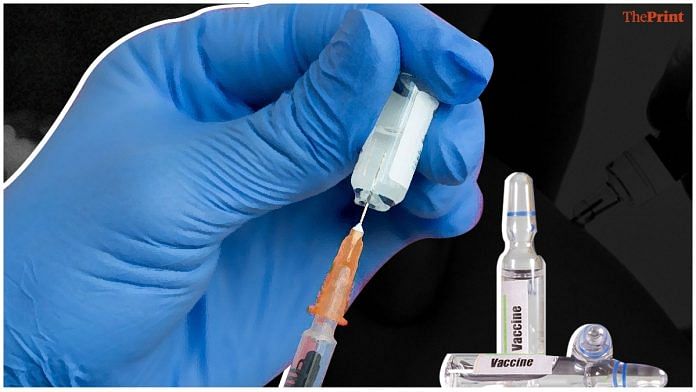New Delhi: Three Covid-19 vaccine candidates — by Moderna, Pfizer, and Oxford-AstraZeneca — have delivered preliminary results of Phase 3 trials this month that show a high level of efficacy in protecting recipients against the novel coronavirus.
Phase 3 trials are the final stage in the testing process for a vaccine and are considered the most crucial. They require the vaccines to be administered to large groups of people to establish their efficacy and safety.
But how do researchers recruit the hundreds of volunteers required for this stage, and how exactly is efficacy measured?
Every Phase 3 trial, although designed by its individual sponsor, has some basic elements.
Also Read: 8 Covid vaccines that look most likely to lead us out of pandemic — and where they stand
How volunteers are recruited
A vaccine becomes eligible for a Phase 3 trial after it clears Phases 1 and 2, which are also aimed at assessing safety, efficacy and side-effects but involve much fewer participants.
At this stage, it is given to large numbers of volunteers for scientists to observe the effects of the vaccine on the general population.
For the Pune-based Serum Institute of India, which is sponsoring the Oxford-AstraZeneca trials in India, that number is 1,600. Hyderabad-based Bharat Biotech, which is producing the indigenous candidate Covaxin and is also conducting Phase 3 trials, is looking to recruit 25,800 volunteers.
The trials begin with the selection of hospitals where they will be performed. Every hospital selected to administer the vaccine is told the number of volunteers it must recruit. Clinical research organisations (CROs), entities that help conduct these trials, are often engaged to do the leg-work of recruiting volunteers.
“We have an ethics committee that decides whether it is okay for us to advertise a call for volunteers. They also approve a team of field workers to organise volunteers for us,” said Dr Mohammed Shameem, a principal investigator from Aligarh Muslim University, which is a trial site for Covaxin.
These studies are “double-blind”, which means neither the doctor nor the participant knows whether a volunteer has been given the vaccine or a placebo. Volunteers must fill in paperwork and a consent form, after which their details are filled into an interactive web response system (IWRS) or an equivalent system that provides doctors with a randomised code. A vial with the corresponding code — containing either a placebo or vaccine — is then administered to the participant.
“Only the third-party sponsor (the manufacturer of the vaccine) is aware of who has been given what,” said Dr Sushant Meshram, an investigator involved in the Serum Institute of India’s Covishield trial.
“At the end of the study, the data is segregated into those who got the vaccine and those who got the placebo, to check the efficacy,” he added.
Also Read: Covid vaccine may be ready early 2021 but distribution to take over a year, says AIIMS director
Administration and follow-up
Dr Dhananjay Lad, managing director of Goa-based CROM Clinical Research, is helping a trial site in the state testing Covaxin.
Lad told ThePrint that each volunteer submits blood and swabs at the time of vaccine administration. If the results are positive, the patient is not invited back for a booster shot and is given standard of care treatment. If negative, the patient is called back after 28 days for a second round.
“If, during the course of the trial, something goes wrong, we are at liberty to check if the patient was given the vaccine or placebo, and that data is unblinded,” said Lad. “All patients are followed-up with and checked every month.”
Dr Shameem said the hospital has recruited staff to stay in touch with volunteers over the phone to monitor any adverse effects, apart from conducting a monthly check-up.
The interim analysis
Simply put, a vaccine is considered efficacious if it is able to prevent healthy volunteers from contracting the virus. A Phase 3 trial, from beginning to end, usually lasts around a year or longer so scientists can observe the vaccine’s long-lasting effects. All Covid-19 vaccine trials in Phase 3 are likely to continue through 2021.
The results declared by Moderna, Pfizer and Oxford-Astra-Zeneca came after they completed what is called an interim analysis, which involves a certain set of data collected while the trial is underway.
The interim analysis is done after a certain number of participants become Covid-19 positive after they have received both doses. This number is determined by a statistician with the trial sponsor.
Next, the data of these Covid-19 positive cases is unblinded to check the proportion of cases that received the placebo as opposed to the vaccine.
Pfizer, for example, conducted its interim analysis after 94 volunteers were diagnosed with Covid-19 through the course of the trial, and declared the vaccine 90 per cent efficacious, because most of these positive cases had been given a placebo. Similarly, Moderna unblinded the data of 95 positive cases to find its vaccine was 94.5 per cent efficacious.
“If, out of the positive cases that crop up during the health monitoring, you see that all of them were given placebo and none the vaccine during the interim analysis, that would suggest a very strong immunogenic response, which would be reason enough to apply for emergency use of the vaccine. That’s why it is done,” Lad said.
This process of measuring efficacy is repeated at the final analysis of the trial, where a higher number of emerging positive cases are unblinded to check the vaccine-to-placebo ratio. For Pfizer, for instance, this number is 164 cases. Each sponsor arrives at this number independently through their own calculations.
The percentage signifying the vaccine’s efficacy could change over the course of time, as more cases are taken into consideration.
Also Read: Re-infections will decide how many Covid shots India needs — vaccine expert Gagandeep Kang



